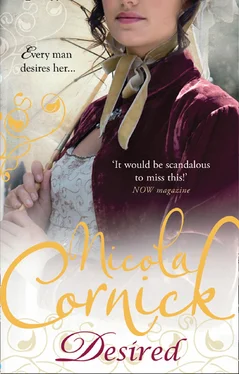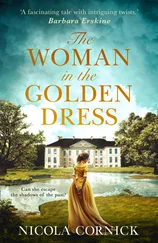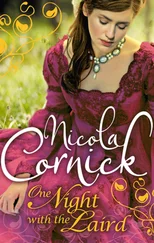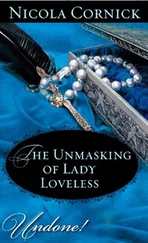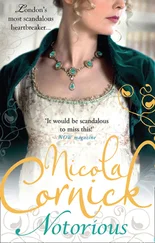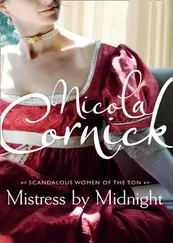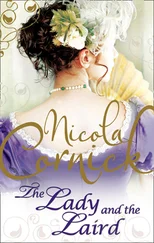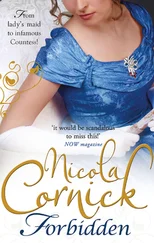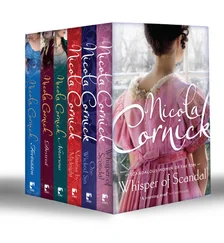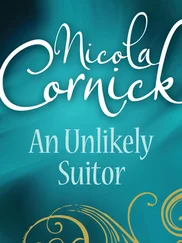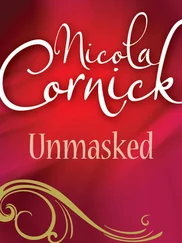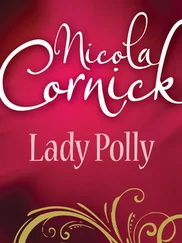Once her feet were firmly on the pavement, Rothbury released her and stood back, but his gaze was still fixed intently on her face. He was, Tess realised, still waiting for her reply to his question.
“There is a business proposition I would like to discuss with you, Lord Rothbury,” she said, “but not out here in the street.” Her voice was not quite as steady as she might have wished. It lacked authority and she hated that.
Rothbury bowed ironically. He looked completely unsurprised, as though his female acquaintances frequently appeared unannounced on his doorstep to discuss some sort of mysterious business. Perhaps they did, Tess thought. She had heard enough about his past as an adventurer to know that her unexpected arrival was probably the least exciting or unforeseen thing that had happened to him all year.
“Then please step inside.” He stood back to allow her to precede him up the steps and into the hall. Tess’s immediate impression was of darkness. The hall was so full of statuary and enormous china vases that she was afraid she might blunder into one of them in the gloom. The previous Lord Rothbury, she recalled, had been a scholar of ancient civilisations. The collection must represent some of his research. She repressed a shudder. The house felt as dry and lifeless as a museum display.
“A mausoleum, I know.” Rothbury’s voice cut through her thoughts, reading them with uncanny accuracy. “I have yet to decide what to do with it.” He glanced at her. “Did you ever meet my cousin, the previous viscount, Lady Darent?”
“Not that I recall,” Tess said. “I heard he was a prodigious academic, always travelling and adding to his collections.”
Rothbury nodded. “We shared a love of travel, he and I. It makes for a bond between us even though we never met.” He smiled. “I assume that you know the rest of my inherited family though—my great-aunts Ladies Martindale, Borough and Hurst?”
Tess looked up sharply. This was even better than she had imagined. Ladies Martindale, Borough and Hurst were a trio of the most fearsomely upright dowagers in society.
“Lady Martindale is a very high stickler—completely terrifying,” Tess said.
“Even to you?” Rothbury murmured. “I thought you impervious to the disapproval of society.”
He loosed his coat and handed it with a word of thanks to a butler who looked as though he was part of the statuary.
“Would you like Houghton to take your cloak, Lady Darent, or will your stay be of short duration?” There was gentle mockery in his voice.
Tess hesitated. The house was not cold but she felt as though she required the extra layers of protection her cloak gave her, rather like a suit of armour. The conviction beat in her mind that she was about to make a very serious mistake. Despite all of Rothbury’s advantages—impotence, respectable relatives—she could not quite get past her discomfort.
But whilst she had been thinking, he had taken her arm and steered her into the library. The double oak doors shut behind her with a stealthy snap and it felt like another trap closing.
“I apologise if you think me high-handed.” His smile stole her breath, something that happened so rarely to her that for a moment Tess wondered if the tightness in her chest meant that she was ailing. The charm of handsome men generally left her utterly cold.
Rothbury leaned back against the library doors, arms crossed, broad shoulders resting against the panels, another barrier to her escape.
“I am at your service,” he murmured, “whenever you are ready to acquaint me with this business proposition you have.”
Tess’s throat dried. “I wanted …” She groped for the words that had scattered like petals in the breeze. “That is, I thought …”
One dark brow rose quizzically as Rothbury surveyed her confusion.
“I came here—” Gracious, she had lost all her town bronze. This would never do.
“I came here to ask you to marry me,” she finished, with all the finesse of a tongue-tied schoolgirl. “In name only, that is. I wish for a marriage of convenience.”
Mortified, she stood pinned to the spot whilst a burning blush seemed to creep up from her toes to engulf her entire body. It was difficult to see how matters could have gone more painfully awry. She had wanted to be so cool, so composed. She had wanted to be herself , Teresa, Dowager Marchioness of Darent, poised and self-assured. Instead, this man had taken all her confidence and turned it inside out. She should have known not to engage in this dangerous game of using Rothbury for his name and his protection, because any moment now he would call her bluff, accuse her of sedition and very likely have her thrown in the Tower of London.
Rothbury was silent for a very long moment. Finally, when Tess was about to stammer an apology and climb out of the window in her desperation to escape, his shoulders came away from the door and he started to move towards her. Panic gripped her by the throat as he drew closer to her. There was something about his physical presence that was so powerful, so authoritative, that it made her supremely uncomfortable. She did not feel threatened by him in the same way as she had by Brokeby, with that terrible fear that had made her skin crawl. Rothbury, she knew instinctively, was not a man who would ever hurt a woman. Even so his physical proximity filled her with unease.
Rothbury took her chin in his hand and turned her face to the faint light that penetrated the room from the long windows. Tess tried to remain still beneath his touch although the impulse to break away from him was strong. No one touched her. Ever.
“An extraordinary suggestion,” he murmured. “A marriage in name only. Why would you wish for that?” He allowed his hand to fall and Tess felt the relief swamp her, heady as wine, enough to turn her dizzy for a brief moment. Rothbury took a step away from her and then turned sharply back on his heel.
“It was not a rhetorical question,” he said.
Tess jumped. “Oh!” Her mind was a blank. Why had she not anticipated that Rothbury might ask that question—and a great many more difficult questions besides? She had hurried off to proposition him without laying the groundwork first. She should have realised that he was not the kind of man, like Darent before him, to accept such an arrangement without debate.
Rothbury was still watching her with one eyebrow raised in an odiously quizzical manner. And her mind was still blanker than a blank canvas.
“No doubt you will share your reasons with me before too long,” he said, still in the same gentle drawl. “Meanwhile, I have another question. This may seem impertinent, Lady Darent—vulgar, even—but I have to ask it.” He smiled. “What exactly is in this for me?”
OWEN HAD HAD A VERY entertaining ten minutes, possibly one of the most unexpected and interesting ten minutes that he had experienced in his entire life. He had received a number of marriage proposals over the course of his thirty-two years. Some had been from enterprising courtesans on the make, others from respectable young ladies seeking to escape the tedium of life in the schoolroom. One had been from a fabulously wealthy princess wanting to run away from an arranged marriage to a fellow royal. None had been as brazen as this proposal of a marriage of convenience from so notorious a widow who collected husbands with a similar reckless abandon to which King Henry VIII had gathered and shed his wives.
Owen had never imagined himself as anyone’s fourth husband. Until ten minutes before, the idea of marriage had been the last thing on his mind. And marriage to Teresa Darent, of all people … It was an absurd notion.
It was a fascinating notion .
What interested him in this moment was why Tess was asking. He had a very strong suspicion that she was playing a game of bluff and double bluff with him; she knew he suspected her of being Jupiter so she had come to defuse the threat he presented to her. Marriage was a hell of a way to do it. He admired her tactics. It was a daring move, risky but brilliant, demonstrating a breathtaking audacity. The decision he had to make was whether he was prepared to play her game, and all Owen’s gambling instincts told him to engage. He had been an adventurer all his life even if he now had the respectable cloak of a viscount’s title and fortune.
Читать дальше
